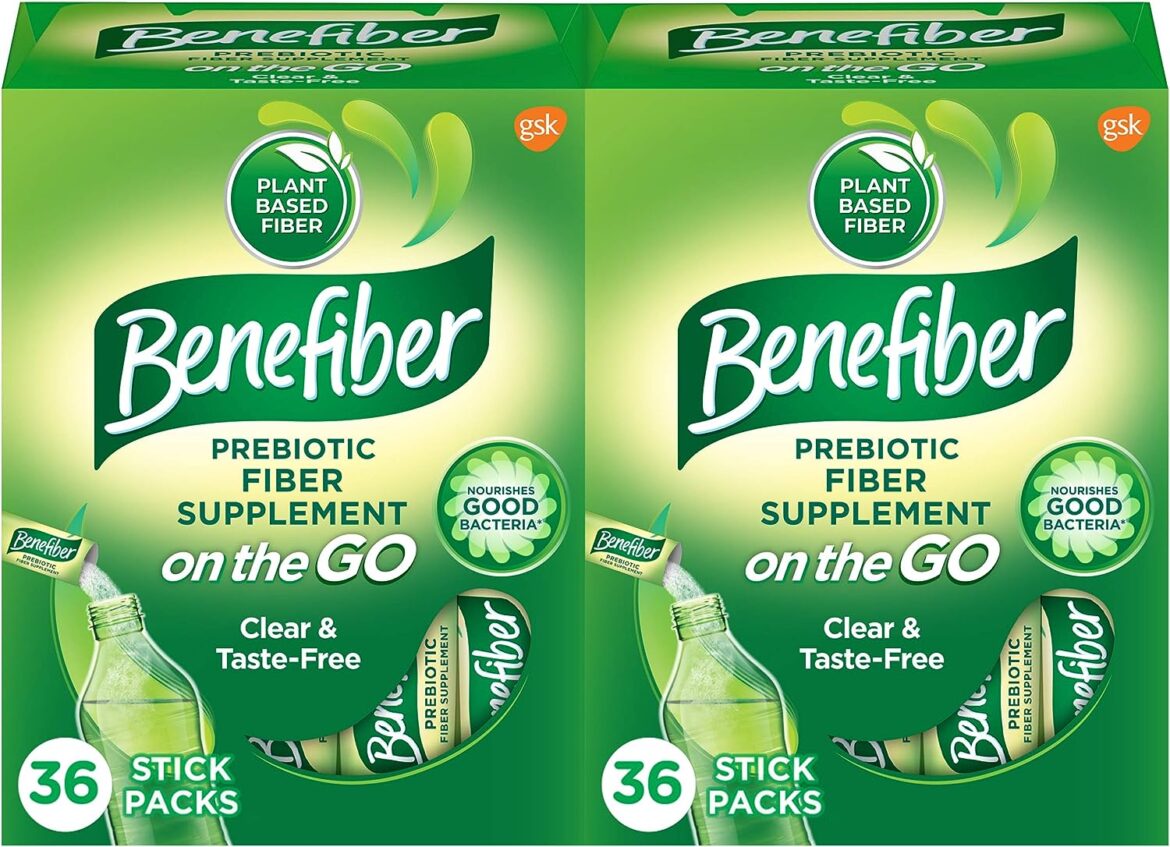Introduction
Does Benefiber Help With Weight Loss: In the ever-evolving world of health and wellness, individuals are constantly seeking effective and sustainable strategies to manage their weight and improve overall well-being. Among the myriad of products and supplements available, Benefiber has garnered attention as a potential aid in the pursuit of weight loss. This natural, fiber-based supplement has gained popularity for its purported ability to promote satiety, regulate appetite, and support digestive health – all factors that can play a crucial role in weight management We’ll examine the science behind Benefiber, its potential impact on weight management, and the considerations one should keep in mind when incorporating it into their dietary regimen.
Benefiber is a dietary supplement that primarily consists of wheat dextrin, a soluble fiber derived from wheat starch. Unlike some other fiber supplements, Benefiber is flavorless and easily dissolves in beverages and foods, making it a convenient addition to one’s daily routine. Its main claim to fame is its ability to increase daily fiber intake without the need for significant dietary changes.
While Benefiber’s potential benefits in weight management seem promising, it’s essential to note that scientific studies specifically examining its role in weight loss are somewhat limited. Most research on the topic has focused on dietary fiber in general rather than Benefiber specifically. However, some studies have suggested that increasing soluble fiber intake, like that from Benefiber, may lead to modest reductions in body weight and body fat over time, particularly when part of a balanced diet and regular physical activity.

Can I use Benefiber to lose weight?
Helps with weight management: Benefiber helps improve satiety, thereby reducing cravings and urge to overeat. Consuming a fiber-rich diet along with regular physical activity may aid in weight loss.
The Role of Fiber in Weight Loss
Appetite Control: Soluble fiber, like that found in Benefiber, absorbs water in the stomach, leading to an increased feeling of fullness. This can help you eat less and reduce overall calorie intake.
Blood Sugar Regulation: Fiber can slow the absorption of sugar in the bloodstream, helping to stabilize blood sugar levels. This can reduce cravings for sugary and high-calorie snacks.
Digestive Health: Fiber supports regular bowel movements and can alleviate constipation, contributing to overall digestive well-being. A healthy digestive system can be crucial for maintaining a healthy weight.
The Potential Benefits of Benefiber for Weight Loss
Increased Satiety: Adding Benefiber to your diet may help you feel fuller for longer, which can lead to reduced calorie consumption and support weight loss efforts.
Reduced Cravings: Benefiber’s ability to stabilize blood sugar levels might help reduce cravings for unhealthy snacks and sugary foods, making it easier to adhere to a calorie-controlled diet.
Digestive Comfort: Benefiber can promote regular bowel movements and alleviate digestive discomfort, ensuring you stay comfortable and motivated throughout your weight loss journey.
Can you lose weight with fiber powder?
There are many different types of fiber supplements on the market, but the ones that have been proven to help people lose weight in clinical studies include glucomannan, psyllium husk, and inulin. Of these options, glucomannan has been shown to be one of the most effective at promoting weight loss.
The Role of Fiber in Weight Management
Satiety: Fiber has a unique ability to absorb water and expand in the stomach, which can lead to an increased sense of fullness and reduced appetite. This, in turn, may contribute to consuming fewer calories.
Calorie Control: Foods rich in fiber are often less calorie-dense than their low-fiber counterparts. By incorporating fiber-rich foods or supplements like fiber powder, you can maintain a satisfying diet while managing calorie intake.
Blood Sugar Regulation: Soluble fiber, found in many fiber powders, can slow down the absorption of sugar in the bloodstream, helping to stabilize blood sugar levels and curb cravings for high-sugar, high-calorie snacks.
Digestive Health: Fiber promotes regular bowel movements, prevents constipation, and supports a healthy digestive system, which can enhance overall well-being and contribute to weight management.
Is fiber good for losing belly fat?
Soluble fiber helps keep your gut bacteria healthy and promotes overall fat loss by reducing your appetite. To further promote belly fat loss, combine your soluble fiber intake with other lifestyle changes, such as making healthier food choices and exercising more.
How Fiber Aids in Weight Loss and Belly Fat Reduction
Satiety and Reduced Caloric Intake: Fiber has a unique ability to absorb water and expand in the stomach, leading to a feeling of fullness and satiety. When you feel full, you are less likely to overeat or consume excessive calories, which is crucial for weight loss, including the reduction of belly fat.
Control of Appetite: High-fiber foods take longer to chew and eat, slowing down the eating process. This delay allows your body’s hunger and fullness cues to align more accurately, helping you avoid overeating or consuming unnecessary calories.
Blood Sugar Regulation: Soluble fiber, in particular, can slow the absorption of sugar into the bloodstream, preventing rapid spikes and crashes in blood sugar levels. Stable blood sugar levels can reduce cravings for sugary, high-calorie foods that contribute to belly fat accumulation.
Reduced Inflammation: Some research suggests that a high-fiber diet may help reduce chronic inflammation, which is associated with weight gain and abdominal obesity.
Tips for Incorporating More Fiber into Your Diet
Increase Fruit and Vegetable Intake: Aim to fill half your plate with fruits and vegetables at each meal. These foods are rich in fiber and provide essential vitamins and minerals.
Choose Whole Grains: Opt for whole grains like brown rice, quinoa, oats, and whole wheat bread instead of refined grains. Whole grains are higher in fiber and provide longer-lasting energy.
Snack Wisely: Replace processed snacks with fiber-rich options like nuts, seeds, and fresh fruit. These snacks are more satisfying and can help control hunger between meals.
Is it OK to take Benefiber everyday?
You can take Benefiber or Metamucil up to three times per day, but you should increase how often you take it slowly. Start by taking it once each day. You can work up to taking the supplement three times per day over the course of one to two weeks.
The Benefits of Taking Benefiber
Digestive Health: Benefiber can promote regular bowel movements and alleviate symptoms of constipation. It can also support overall digestive health by maintaining a healthy gut environment.
Weight Management: Benefiber’s soluble fiber content may help increase feelings of fullness and reduce appetite, potentially aiding in calorie control and weight management.
Blood Sugar Regulation: The soluble fiber in Benefiber can slow the absorption of sugar in the bloodstream, helping to stabilize blood sugar levels.
Heart Health: A diet rich in soluble fiber, like that found in Benefiber, is associated with reduced cholesterol levels, which can contribute to heart health.
Is It Safe to Take Benefiber Every Day
Dosage: Follow the recommended dosage instructions on the Benefiber product label. Overconsumption of fiber supplements can lead to digestive discomfort, including gas, bloating, and diarrhea.
Hydration: It’s crucial to drink plenty of water when taking Benefiber daily. Fiber absorbs water, and adequate hydration helps prevent potential digestive issues.
Individual Tolerance: Some individuals may be more sensitive to fiber supplements than others. If you’re new to fiber supplementation, start with a lower dose and gradually increase it to allow your body to adjust.
Underlying Medical Conditions: If you have specific health concerns or underlying medical conditions, consult with a healthcare professional before incorporating Benefiber into your daily routine.
Is benefiber good for you?
Prebiotic fiber doesn’t just support a healthy digestive system, it nourishes the growth of good bacteria. Additionally, Benefiber Advanced Digestive Health can help relieve occasional constipation and abdominal discomfort* which is good news for the estimated 19% of North Americans who experience constipation.
The Potential Benefits of Benefiber
Digestive Health: One of the primary benefits of Benefiber is its ability to promote regular bowel movements and alleviate symptoms of constipation. The soluble fiber in Benefiber creates a gel-like substance in the digestive tract, softening stools and aiding in their passage.
Appetite Control: Benefiber’s soluble fiber content can increase feelings of fullness and satiety. This can help reduce overeating, control calorie intake, and support weight management efforts.
Blood Sugar Regulation: Soluble fiber, found in Benefiber, can slow down the absorption of sugar in the bloodstream, helping to stabilize blood sugar levels. This can be especially beneficial for individuals with diabetes or those looking to manage their sugar cravings.
Heart Health: Consuming soluble fiber has been associated with lower cholesterol levels. By reducing LDL (bad) cholesterol levels, Benefiber may contribute to heart health.
Gut Microbiome: Fiber is known to support a healthy gut microbiome, which is essential for overall digestive health and may have broader implications for the immune system and general well-being.
Who should not use Benefiber?
People who are sensitive to gluten should avoid Benefiber. Anyone experiencing an allergic reaction while taking these products should stop taking them and call their doctor for testing before continuing. People with certain stomach conditions may need to avoid both Benefiber and Metamucil.
Individuals with Wheat Allergies or Gluten Sensitivity
Benefiber is made from wheat dextrin, and therefore, it contains traces of wheat proteins. Individuals with wheat allergies or gluten sensitivity should avoid Benefiber, as it may trigger allergic reactions or digestive discomfort. Fortunately, there are alternative fiber supplements available that are gluten-free and suitable for those with wheat-related concerns.
Children under Six Years of Age
While Benefiber is generally safe for adults, it is not recommended for children under the age of six. Young children have different nutritional needs, and their digestive systems may not tolerate fiber supplements in the same way as adults. Parents should consult with a pediatrician or healthcare provider before introducing any dietary supplement, including fiber supplements, to their child’s diet.
Individuals on Medications
Benefiber, like other fiber supplements, may interfere with the absorption of certain medications. If you are taking prescription medications on a regular basis, it is advisable to consult with your healthcare provider or pharmacist before using Benefiber. They can help you determine whether Benefiber is safe to use alongside your specific medications and provide guidance on the timing of consumption.
Those Experiencing Severe Digestive Issues
Individuals currently experiencing severe digestive issues, such as persistent diarrhea or gastrointestinal blockages, should avoid using Benefiber until their condition improves. Using fiber supplements during acute digestive problems may exacerbate symptoms and lead to further discomfort.
Pregnant and Nursing Women
While moderate fiber intake is generally considered safe during pregnancy and breastfeeding, pregnant and nursing women should consult their healthcare provider before using Benefiber. It’s essential to ensure that dietary changes, including the addition of supplements, align with the specific nutritional needs of these life stages.
What is the best time to take Benefiber?
The Best Time to Take Fiber
It is often recommended to take a fiber supplement up to twice per day, before a meal, and with a glass of water. This would ensure you’re keeping your digestive system balanced throughout the day.
Before Meals
Taking Benefiber before meals is a common and effective approach. Consuming it 15-30 minutes before a meal allows the soluble fiber to mix with the food in your stomach, creating a gel-like substance that can enhance feelings of fullness and satiety. This can help you control your appetite and potentially reduce overall calorie intake, making it a helpful strategy for those aiming to manage their weight.
With Meals
Another suitable option is to take Benefiber with your meals. Mixing Benefiber into your food or beverage during a meal ensures that you consistently incorporate this dietary fiber into your diet. Doing so can help maintain regularity in your digestive system and provide ongoing support for your overall health.
In the Morning
For individuals looking to establish a daily routine, taking Benefiber in the morning can be a convenient and consistent approach. This helps kickstart your day with a boost of soluble fiber, which can promote regular bowel movements and set a positive tone for your digestive health throughout the day.
Before Bed
Taking Benefiber before bed can be beneficial for those who want to support digestive regularity overnight. While it may not have an immediate effect, consistent bedtime use can contribute to maintaining a healthy digestive system and help alleviate symptoms of constipation or irregularity.
Tailored to Personal Preferences
The best time to take Benefiber ultimately depends on your individual preferences and lifestyle. Some people may find it more convenient to take it with specific meals, while others may prefer to incorporate it into their morning or bedtime routine. The key is to establish a consistent schedule that works for you, ensuring that you don’t forget to include Benefiber in your daily intake.
Is it better to take Benefiber in the morning or night?
Fiber is another nutrient you’ll want to take apart from other supplements and medications, because it interferes with absorption. I recommend doing so before bed if you aren’t taking anything else at that time.
Morning Consumption of Benefiber
Digestive Kickstart: Taking Benefiber in the morning can provide a digestive kickstart for the day ahead. It can help promote regular bowel movements, which is essential for maintaining a healthy digestive system.
Sustained Energy: Some individuals find that taking Benefiber in the morning helps provide sustained energy throughout the day. The gradual release of soluble fiber can help stabilize blood sugar levels, reducing energy spikes and crashes.
Appetite Control: Morning consumption of Benefiber may aid in appetite control throughout the day. By increasing feelings of fullness and satiety, it can support calorie control and weight management efforts.
Consistency: Establishing a morning routine of taking Benefiber can help ensure that you incorporate this dietary supplement into your daily regimen consistently.
Nighttime Consumption of Benefiber
Overnight Digestive Support: Taking Benefiber at night can provide digestive support while you sleep. This can help maintain regularity and alleviate symptoms of constipation or irregularity in the morning.
Comfortable Routine: Some individuals prefer taking Benefiber at night because it allows them to address their digestive health needs in a relaxed and comfortable setting, away from the rush of the morning.
Less Rush: The evening can be a less hectic time for many people, making it easier to incorporate Benefiber into their routine without feeling rushed.

Conclusion
In the quest for effective weight management solutions, the question of whether Benefiber can aid in weight loss has been explored. While Benefiber is a soluble fiber supplement that may offer some potential benefits in the context of weight management, the evidence supporting its direct role in weight loss is not entirely definitive.
Fiber, in general, plays a valuable role in weight management by promoting feelings of fullness, stabilizing blood sugar levels, and supporting digestive health. Benefiber, being a soluble fiber source, can contribute to these mechanisms, potentially assisting individuals in their weight loss efforts. However, it’s essential to emphasize that Benefiber alone is not a magic solution for weight loss. It should be integrated into a comprehensive strategy that includes a balanced and nutritious diet, regular physical activity, and an individualized approach to health and wellness. The effectiveness of Benefiber in weight management may vary from person to person, and individual factors should be considered.
Before making any significant changes to your dietary regimen or weight loss plan, consulting with a healthcare professional is advisable, especially if you have specific weight loss goals or underlying health conditions. Benefiber can be a useful addition to a holistic approach to weight management, but it should be used in conjunction with other healthy lifestyle choices to achieve and maintain desired results.


2 comments
… [Trackback]
[…] Find More on on that Topic: thefitnessblogger.com/does-benefiber-help-with-weight-loss/ […]
… [Trackback]
[…] Info on that Topic: thefitnessblogger.com/does-benefiber-help-with-weight-loss/ […]